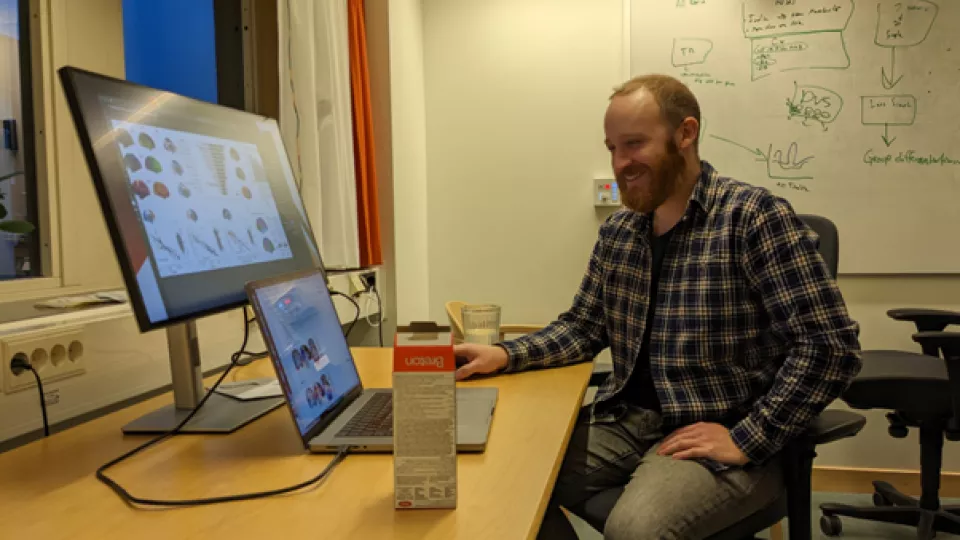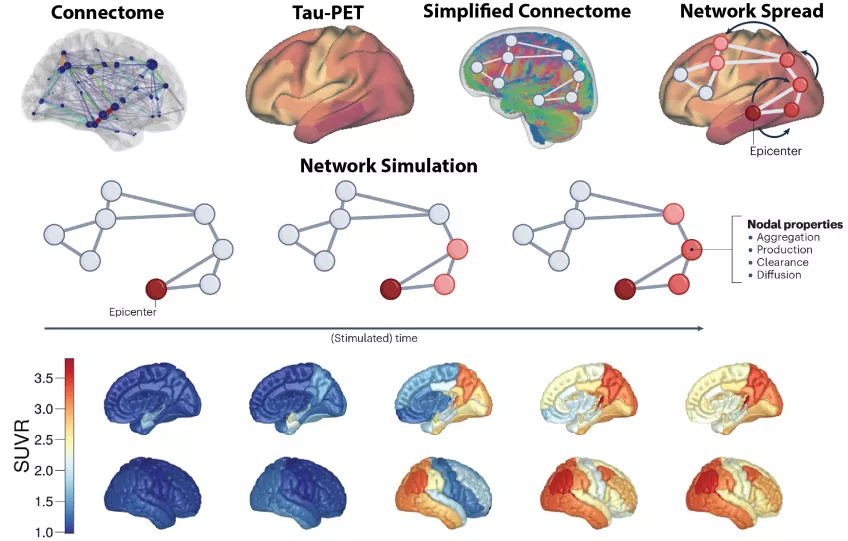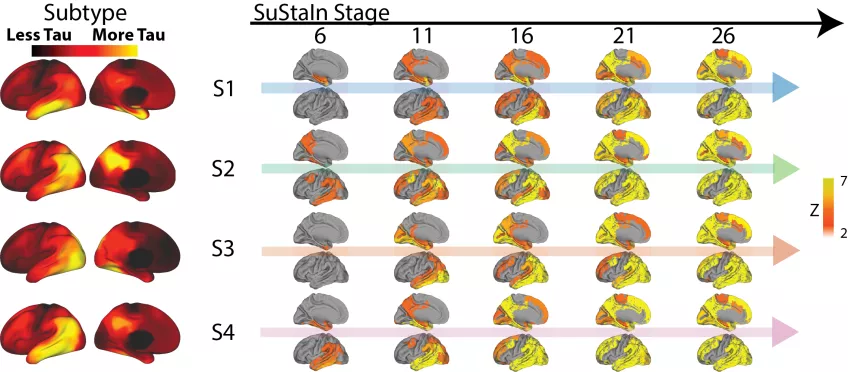Exploring the mind through data and collaboration
Jacob primarily studies Alzheimer’s disease, although he stressed that lessons gathered therein are applicable to other diseases. His interest in neuroscience grew over time, starting from his time at University of California, Berkley, working in a group using neural imaging to better understand aging and Alzheimer’s disease. Jacob was even then focused on the methodological side of data analysis. Specifically, how to best use existing data, what kind of questions we can even ask of it without introducing bias, and how we could combine different datasets to get deeper insights into human biology and disease.
“I learned that you can learn a lot about basic neuroscience through the lens of dementia, because it's sort of like the idea of using the destruction of systems to understand what they do and how they function. […] It is motivating to work on something that could one day help real people, but also very interesting on an intellectual level.”
Asking the right questions
Tackling complicated human biology starts by asking the right question and taking care that it does not bias the answer coming back from the analysis. A large part of his work involves finding the right dataset and making sure that it is properly annotated.
“It's actually a bit of an art, I would say, to really do a data driven approach that lets the data speak without human biases, but also be aware of the methodological biases. […] It's not as simple as ‘Oh, let's go with data. And then let's throw a model at it. And then let's over interpret it!’ It's much more deliberate.”
Jacob’s research primarily involves the analysis of data derived from patients, encompassing a wide range of cognitive and health parameters, from multi-omics sample analyses to brain imaging data and cognitive tests. Insights obtained with this approach require collaboration with other domain experts to interpret and verify. From the earliest steps data acquisition and analysis, Jacob stressed the importance of using independent datasets through which early findings can be validated. This of course takes significant effort but is important to arrive at robust conclusions from diverse patient populations and varied datasets.
“You have to always be aware of human bias. And one of the best ways of doing that is cross validation. We tend to only rarely at datasets that we cannot cross validate with another data set, or at least extend in some way to understand if what we're doing is making sense and is generalizable. And again, that involves effort in terms of curation and collaboration.”
Trajectories of Alzheimer’s disease and the future of multi-omic neuroscience
Neurodegenerative diseases display a variety of symptoms and progression patterns in different people, and these are often poorly understood. As his proudest achievement so far, Jacob highlighted a recent paper which attempted to unravel the diversity of Alzheimer’s disease. The 2021 publication in Nature Medicine characterized the patterns of tau accumulation in Alzheimer's patients' brains. Obtaining and analyzing data from 1677 PET scans was a monumental task, but it paid off by establishing four distinct forms of disease progression and providing a substantial contribution to the characterization of tau accumulation patterns in the brains of Alzheimer's disease patients.
“The most important thing that we did was parsing individual difference from individual progression. […] We modelled several entire trajectories of pathologic change and we described four different canonical patterns of Alzheimer's disease progression, at least in terms of the accumulation of pathology.”
Looking ahead, Jacob is excited about his ongoing work with proteomic data obtained from cerebral spinal fluid. This data provides a molecular perspective on what's happening in the brain, offering unprecedented insights into levels of 1000s of different proteins from living patients. So far this kind of data has proved to be robust and reproducible. With it, Jacob aims to uncover specific proteins as well as networks related to different phenotypes in human brains’ health and disease.
Challenges of hype, curation, and access
Jacob highlighted several challenges in the field of neurodegenerative disease research. The pressure to publish high-impact studies can lead to shortcuts and delay data sharing, running counter to the pursuit of reliable findings. It can also result in mediocre studies or those which simply returned a negative result simply not being published. Aside from access, lack of standardization in both data collection and annotation makes it hard to use the wealth of already existing data.
“That is a very challenging question. I would go rather more broadly, and focus on the mentality that people have, where you're in a sort of publish or perish system. There your incentives are based on high impact publications that tend not to be terribly reproducible.”
On top of that, issues related to data privacy and protection make accessing and sharing valuable datasets cumbersome. With access to sensitive patient data, researchers must navigate a complex landscape of ethical and legal considerations.
Research at the intersection of scientific communities
Jacob holds the prestigious title of a DDLS (Data Driven Life Science) fellow. The DDLS program was created to attract motivated data scientists to Sweden and is dedicated to fostering data-driven research at the intersection of life sciences and technology. The program provides him with access to cutting-edge resources and services while promoting networking and education.
“I'm really happy to be a part of DDLS, there's been a lot of excellent investment in infrastructure and in attraction of talent. I think that the focus on not just the analysis, but also curation and using the FAIR principles (findable, accessible, interoperable, reusable) is all very progressive and very exciting and motivating.”
MultiPark, another important part of his research ecosystem, offers a platform for interdisciplinary collaboration on the study of Alzheimer’s and Parkinson’s disease. For Jacob, it is a valuable source of knowledge and a welcome change in perspective towards molecular mechanisms and animal models, where researchers can learn a lot from each other. While he is not affiliated with WCMM directly, Jacob collaborates with some of its fellows and shares a great amount of kinship with the center. He also emphasized that his science is enriched by having the WCMM close by.
Jacob’s experience at the intersection of multiple research networks and domains has been overall a very positive one, as collaboration is encouraged both inside and between the above-mentioned organizations.
“Ultimately, what's important is getting researchers together and providing the resources and services that can help them implement their collaborative work. In that regard, the scientific networks are very effective. And I don't think there's anything like: ‘Oh, I'm in MultiPark so, I can’t be WCMM.’ It's not like that, it's just a way for researchers to find each other.”
In conclusion, Jacob Vogel's work in the field of neurodegenerative diseases is characterized by a rigorous approach to data analysis, a passion for unraveling the complexities of brain function, and active collaboration across diverse scientific networks.





